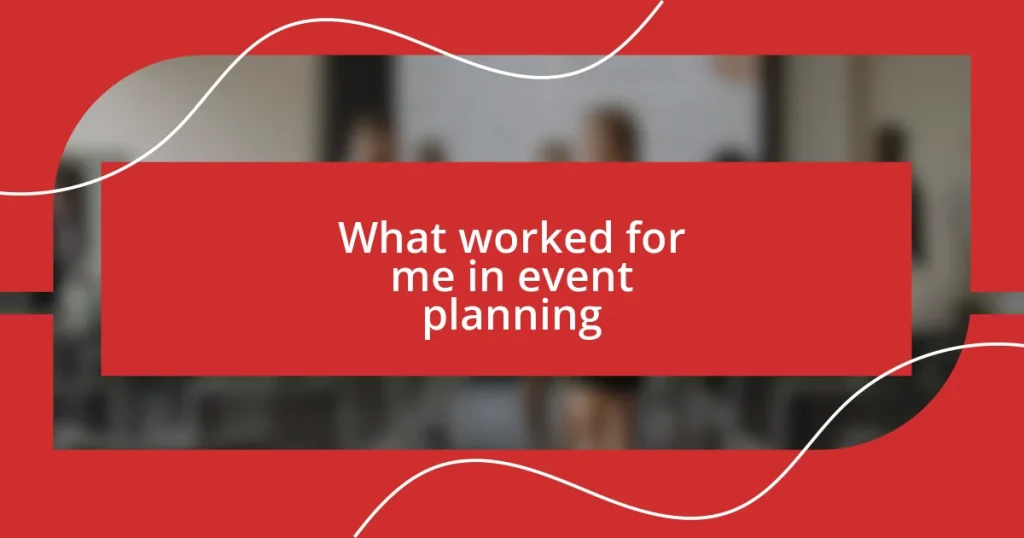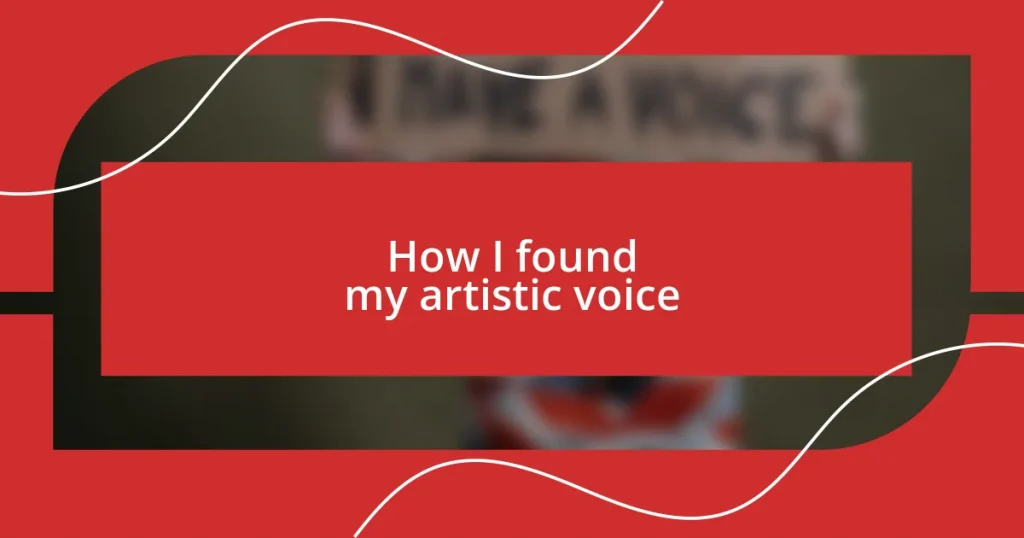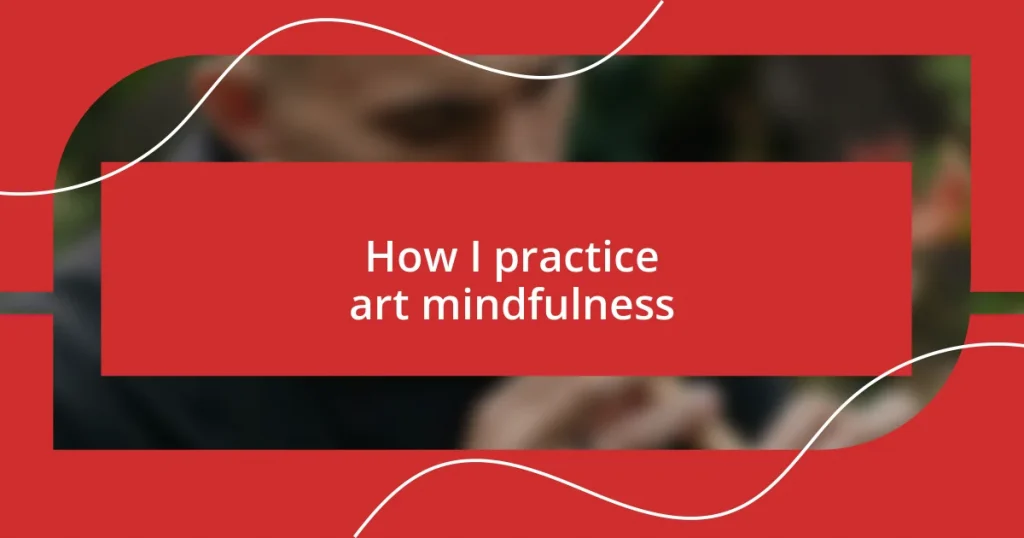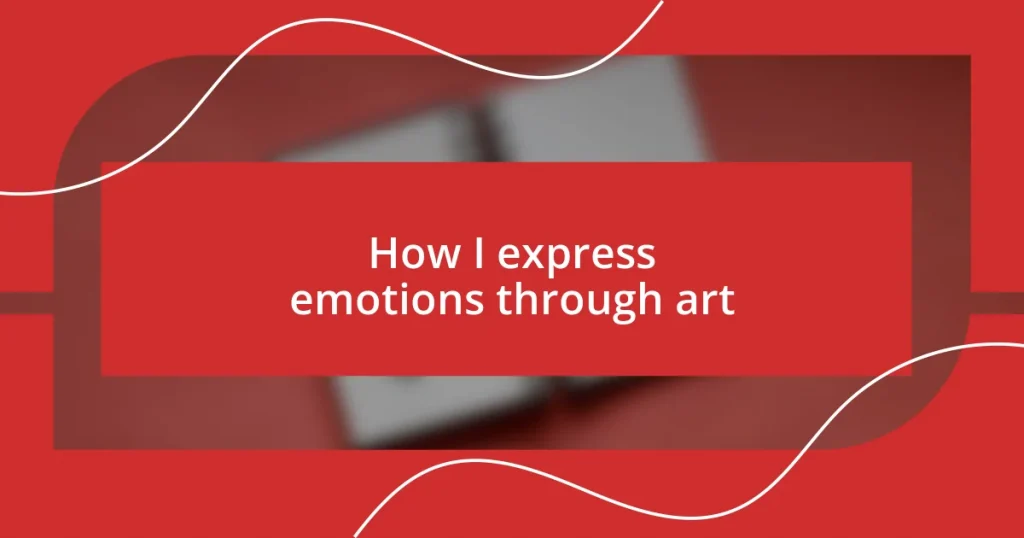Key takeaways:
- Event planning requires a solid foundation, including organization, clear goal-setting using SMART criteria, and flexible budgeting to handle unexpected costs.
- Choosing the right venue is crucial; it should be accessible, fit the event’s purpose, and create the desired emotional ambiance for attendees.
- Post-event evaluation through feedback and data analysis is essential for continuous improvement and building trust with your audience.
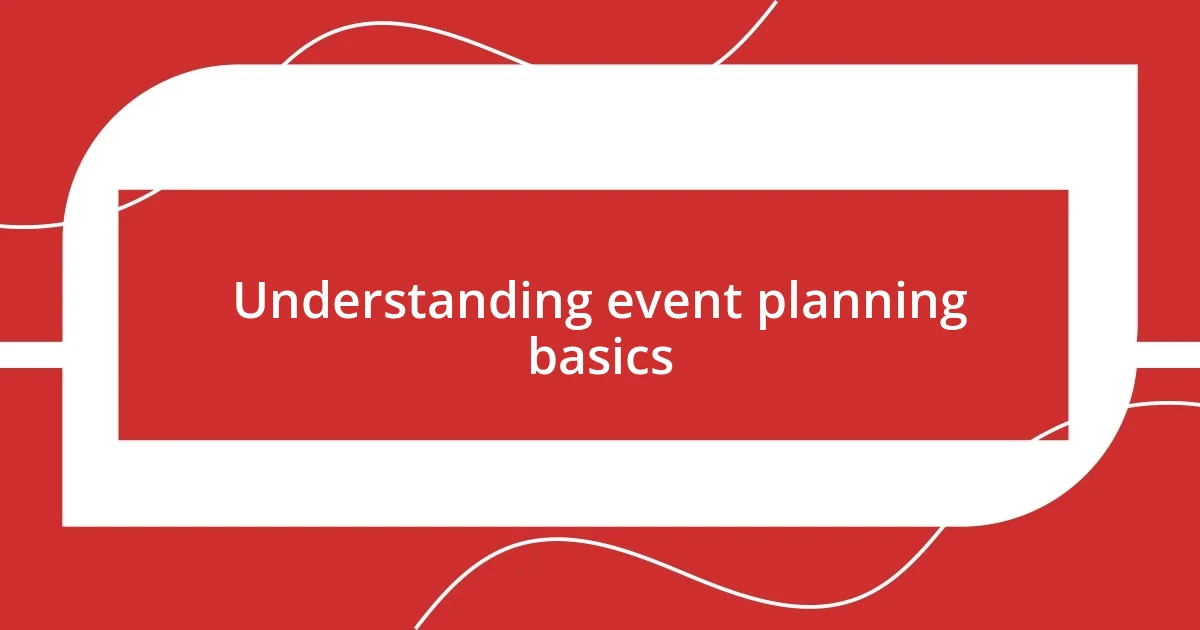
Understanding event planning basics
Event planning may seem like a straightforward process, but understanding the basics is crucial. It’s a bit like setting the foundation for a house; without a solid base, everything that follows can become shaky. I remember my first event—it felt chaotic, but I quickly learned that organizing the details ahead of time makes all the difference. Have you ever felt overwhelmed by the sheer volume of tasks? Breaking them down into smaller, manageable steps can alleviate that pressure.
At its core, event planning involves logistics, creativity, and communication. One key aspect I’ve found is staying organized—having a checklist has been my lifesaver. The thrill of crossing items off that list is oddly satisfying, isn’t it? It keeps me grounded and focused, especially when unexpected challenges arise. When was the last time you faced a surprise during planning? I once had a vendor cancel last minute, and because I had everything documented, I easily found an alternative—crisis averted!
Budgets also play a pivotal role in effective event planning. I’ve experienced the excitement of a creative idea only to reel it back in when I looked at the costs. It’s a dance between dreams and reality. Have you ever had to compromise on your vision due to budget constraints? Balancing aspirations with financial realities can be tough, but it often sparks innovative solutions I wouldn’t have considered otherwise.
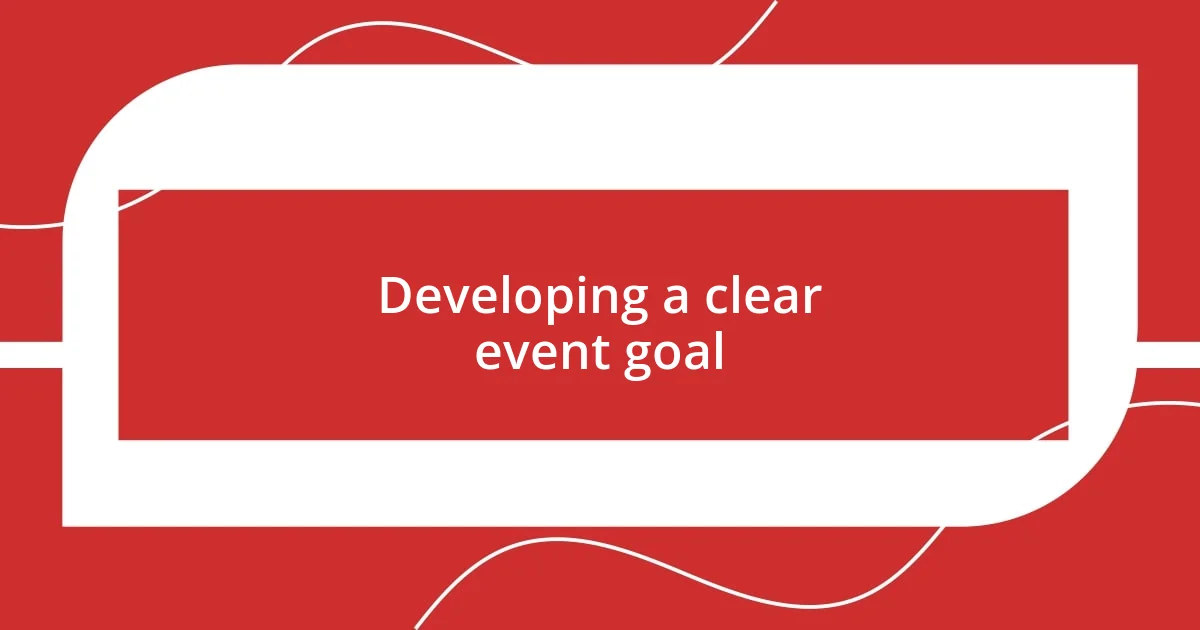
Developing a clear event goal
When it comes to developing a clear event goal, I can’t stress enough how vital it is to define what success looks like for your event from the get-go. A well-defined goal serves as a compass, guiding every decision and action throughout the planning process. I recall planning a fundraising gala; our goal was to raise $50,000. Keeping that figure in mind helped me prioritize everything, from the venue choice to the sponsorship packages. Have you ever had a project where clarity in goals made all the difference?
I often use the SMART criteria—Specific, Measurable, Achievable, Relevant, and Time-bound—to shape my event goals. For instance, instead of saying, “I want a successful event,” I would specify, “I want to attract 200 attendees and raise $10,000 in ticket sales.” This method not only clarifies my vision but also gives me tangible targets to assess progress. I still remember the empowerment I felt when our clear goals translated into robust planning strategies.
Another significant aspect is to involve stakeholders in this goal-setting process. Engaging team members or clients in creating the goals fosters ownership and commitment. In one of my previous events, we held a brainstorming session to define our objectives—everyone contributed ideas, and it transformed our shared vision into something we were all eager to achieve together. Have you ever included your team in defining the goal? The collaborative spirit can lead to insights I wouldn’t have considered alone.
| Event Goals | SMART Criteria |
|---|---|
| Vague Goal | Specific Goal |
| “I want a successful event.” | “I want to attract 200 attendees and raise $10,000 in ticket sales by the end of the event.” |
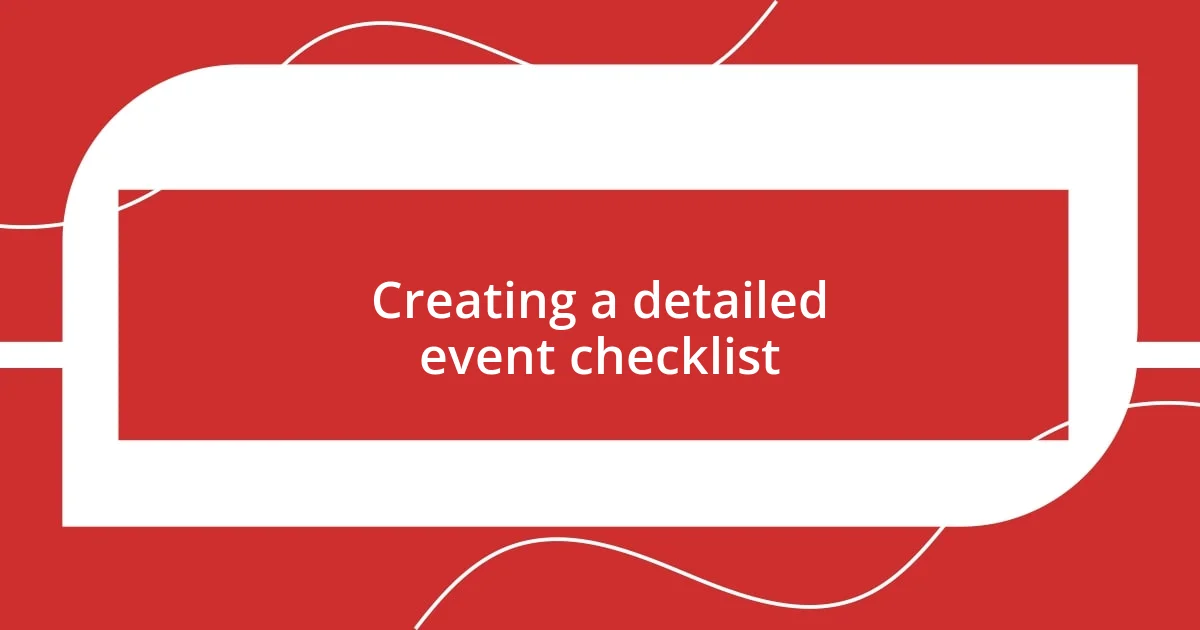
Creating a detailed event checklist
Creating a detailed event checklist is essential for keeping all aspects of your event organized and manageable. I can’t tell you how many times I’ve felt the stress of juggling multiple tasks without a solid plan. In one instance, I forgot to arrange seating for a corporate workshop because it was buried in my mental list. What a scramble that was—and I learned quickly that everything needs a dedicated spot on paper. A well-crafted checklist is like a reliable friend that keeps you on track when the pressure mounts.
Here are some key elements to include in your event checklist:
- Venue Details: Confirm reservation, layout plan, and contact person.
- Timeline: Set deadlines for each task and important milestones leading up to the event.
- Supplies and Equipment: List all needed items such as tables, chairs, audio-visual equipment, and signage.
- Catering: Outline menu choices, dietary restrictions, and confirmation timelines.
- Guest List: Track RSVPs, special requests, and seating arrangements.
- Staffing: Assign roles and responsibilities, including volunteers or hired help.
- Marketing Materials: Ensure you have promotional items, programs, or brochures ready.
- Follow-Up Tasks: Schedule post-event activities, like thank-you notes and evaluations.
With each crossed-off item, I felt more in control and less overwhelmed. A detailed checklist gives me that comforting sense of accomplishment, especially when unexpected hiccups arise. I remember attending a multi-day festival where my checklist helped me stay calm and collected amid the chaos—having a backup plan for everything made a world of difference. The satisfaction of being prepared is just unbeatable!
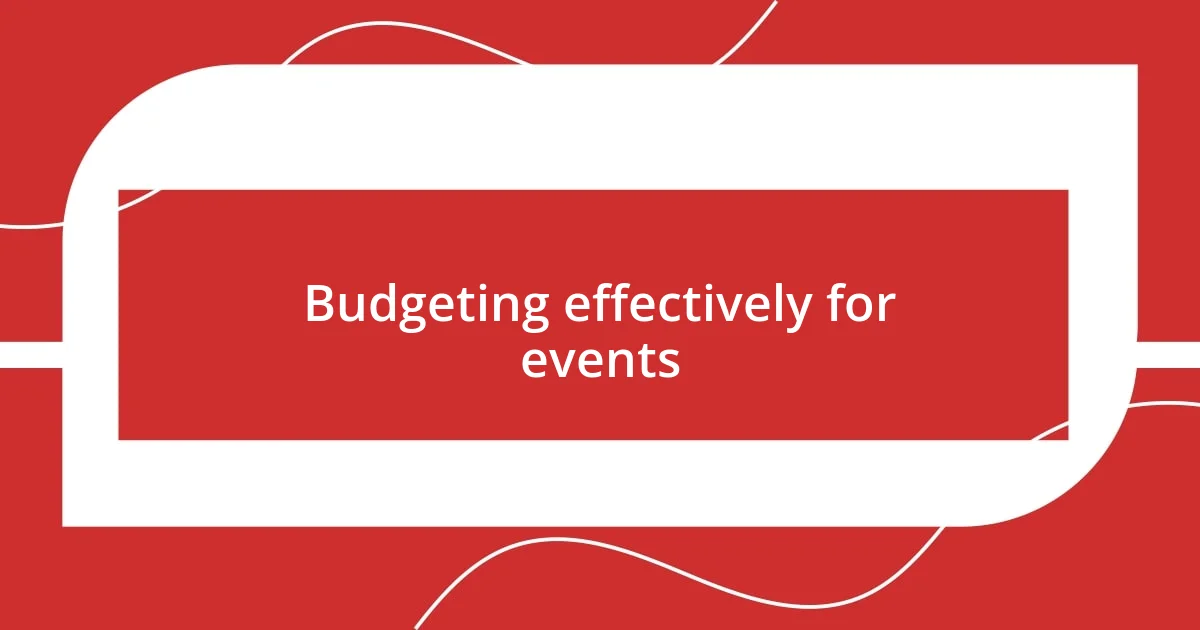
Budgeting effectively for events
Budgeting effectively for events is often where the magic happens—or, if not done right, where things can go awry. I remember a time when I set a budget that seemed generous on paper. However, as the planning progressed, I found out that unforeseen costs, like extra seating and audiovisual needs, crept in. Have you ever experienced a budget spiral like that? It’s a harsh reality that teaches you the importance of flexibility.
Creating a detailed budget that outlines all anticipated expenses can save you a lot of headaches later. I’ve learned to categorize costs into essentials and extras. For instance, I prioritize venue rentals and catering, but I always keep a portion of the budget labeled “unexpected surprises.” Whenever those surprise bills come in, I’m much less likely to panic when I already have a safety net. This approach not only provides peace of mind but also allows for some creative flexibility when opportunities arise, like adding a fun activity that could enhance guest experience.
A big takeaway for me was the significance of tracking every dollar spent during the planning process. Using budgeting tools or simple spreadsheets can help keep all expenses organized. After one event where I forgot to track even a minor expense, I was left with a bitter taste of regret. It was a hard lesson—I could have avoided that tight squeeze had I been more diligent. What tools or methods do you use to stay on top of your budget? I invite you to consider how being proactive in managing finances can transform your event planning experience!
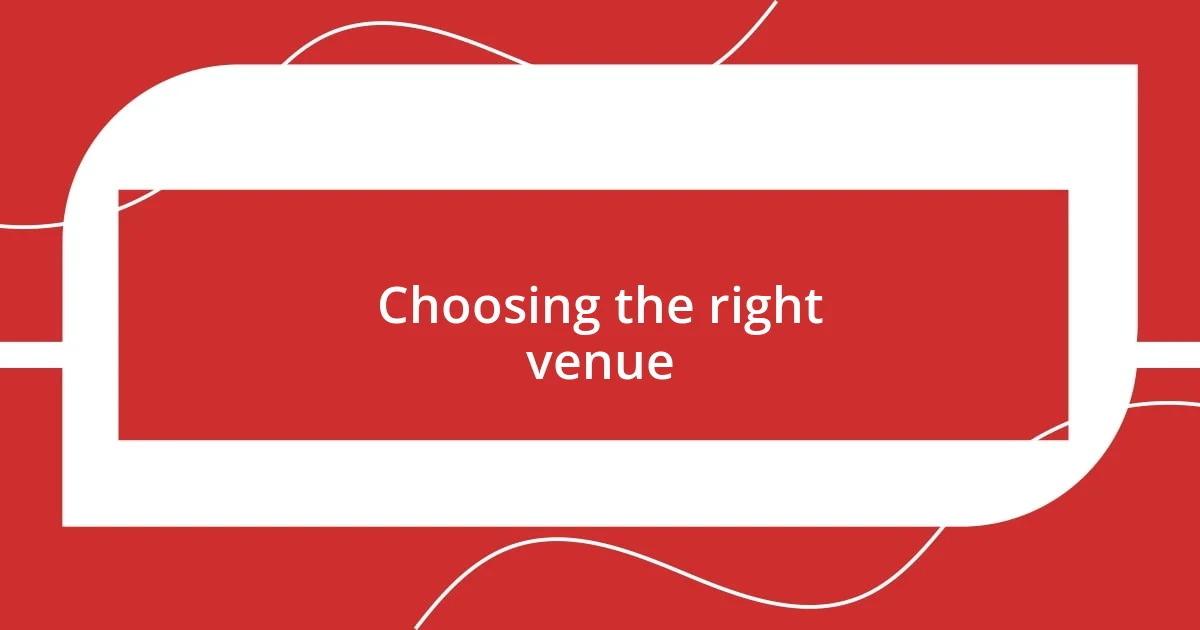
Choosing the right venue
Choosing the right venue can truly make or break your event. I recall a time when I chose a local community center because it seemed budget-friendly. As I arrived for setup, I was shocked to discover that the acoustics were terrible, making it hard for participants to hear the speakers clearly. It’s a reminder that cost shouldn’t be the only factor; the venue needs to match the event’s purpose and audience.
One critical aspect I always consider is location. Is it easily accessible for your guests? I remember planning a birthday party in a beautiful, remote spot that required half my friends to drive over an hour just to get there. Instead of excitement, I saw stressed faces as they arrived late, and the atmosphere didn’t quite meet my expectations. A good venue should be convenient for the majority of your attendees, as you want them to arrive ready to engage and celebrate, not frazzled from travel.
Lastly, don’t underestimate the emotional ambiance a venue creates. During a charity gala, we opted for a historical building with stunning architecture. The moment guests walked in, they were awed; the venue set the tone perfectly and sparked generous contributions. Have you thought about how the atmosphere of your venue can impact your guests’ experience? The right space can evoke feelings and memories, making your event unforgettable—I’ve learned this through countless experiences where the venue choice became a key element in the event’s success.
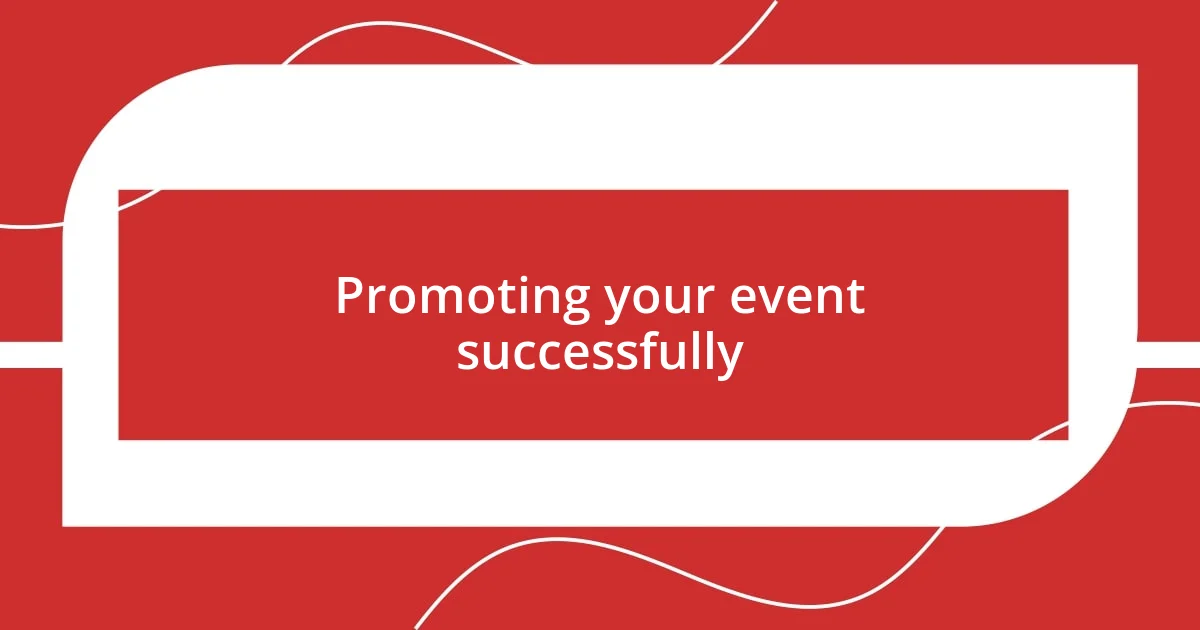
Promoting your event successfully
Promoting your event successfully is an art form that goes beyond simply spreading the word. When I first started planning events, I focused solely on social media, thinking that would reach everyone. But one year, I organized a local festival and learned the hard way that diverse approaches matter. I incorporated flyers in local businesses and community bulletin boards, which drove foot traffic and created buzz—something that social media alone didn’t achieve. Have you ever overlooked traditional promotion methods in favor of digital ones? It can be eye-opening to realize that different demographics respond better to various strategies.
I’ve found that storytelling is a powerful tool in event promotion. Instead of just listing details like time and location, I created a narrative around the event. For our festival, I shared anecdotes about the entertainment, guest speakers, and even our mission. When potential attendees connect on an emotional level, they’re more likely to commit to attending. Isn’t it fascinating how a simple story can ignite excitement?
Lastly, engaging with your audience beforehand can create invaluable momentum. I once hosted an interactive countdown on social media, where I posted sneak peeks and encouraged followers to guess the lineup. It was thrilling to see the community buzzing with anticipation and sharing their guesses. That interaction fostered a sense of belonging and excitement, leading to higher attendance than I anticipated. Have you ever tried involving your audience in the promotion process? That little nudge can turn curiosity into commitment, making your event even more successful in the long run.
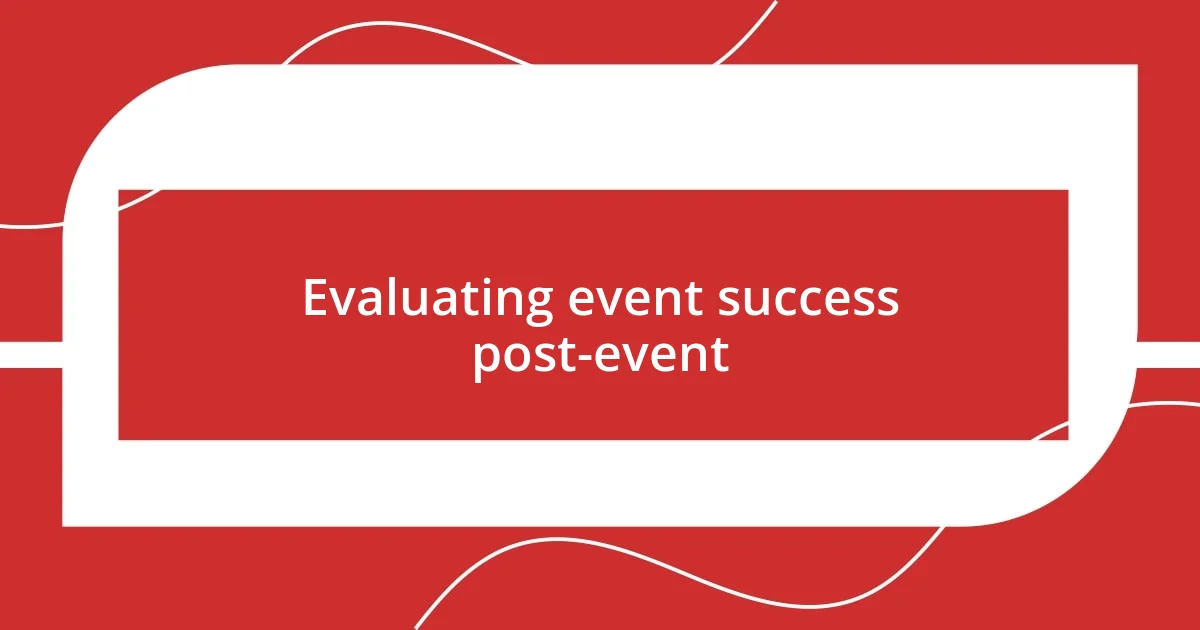
Evaluating event success post-event
Evaluating event success post-event is a critical step that I can’t stress enough. After my last conference, I decided to send out an attendee survey right away, curious to gather their feedback. It was enlightening to see which sessions they loved and what aspects they felt could be improved. Have you ever thought about how feedback could shape your future events? Listening closely to your attendees can guide you in creating even more engaging experiences next time.
Analyzing key metrics like attendance numbers and audience engagement also plays a huge role in evaluation. For my recent workshop, I tracked not only how many signed up but how many stayed for the entire session. Surprisingly, I found that a shorter agenda with interactive discussions kept participants engaged longer. What does that say about our perceived value of time? Every detail elucidates how I can tailor future events to better fit my audience’s preferences.
I’ve learned that sharing the results of your evaluation can also foster a sense of community. After that same workshop, I compiled key takeaways and insights, then sent them out to all attendees. I was pleasantly surprised to receive numerous thank-you notes, with many expressing they felt heard and valued. Isn’t it rewarding to create a feedback loop that not only informs your planning but also strengthens your relationship with your audience? By openly communicating the results and changes, I build trust, and that’s invaluable in the world of event planning.










